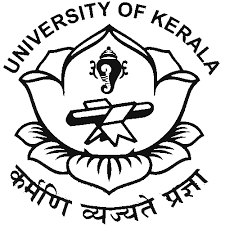General Information
The University of Kerala, located in the state capital Thiruvananthapuram, holds immense historical significance as the first university established in the region. Founded in 1937 as the University of Travancore by the then Maharaja of Travancore, Sri Chithira Thirunal Balarama Varma, it predates the formation of Kerala state itself. It was renamed the University of Kerala in 1957.
As a premier public State University, its mission has been pivotal in shaping higher education across Kerala. It operates a dual structure: it's a major teaching and research university with numerous postgraduate departments and centers primarily located on its Kariavattom campus. Simultaneously, it serves as a large affiliating university, providing academic governance to a vast number of colleges (Arts & Science, Engineering, Law, Education, Fine Arts, etc.) spread across several southern districts of Kerala (including Thiruvananthapuram, Kollam, Alappuzha, Pathanamthitta).
Key Recognitions:
Established originally by the Princely State of Travancore, reconstituted under the Kerala University Act.
Recognized by the University Grants Commission (UGC) under Section 12(B).
Holds the highest 'A++' Grade accreditation from NAAC (National Assessment and Accreditation Council).
Consistently ranked by NIRF among the top universities in India.
Possesses necessary approvals from relevant professional bodies like AICTE, NCTE, BCI for specific programs offered on campus or via affiliation.
MCI Recogination
Recognized for 100 seats when degree granted on or after Apr. 2008. (Previously under Kerala Univ.,Kerala). Not granted permission for increase of seats from 100 to 150 u/s 10(A) for 2019-20, Permission for increase of seats from 100 to 150 u/s 10(A) for 2020-21 & 2021-22. Continuation of recognition for 150 seats granted for 2016-17 batch in academic year 2021-22. Annual renewal permission granted for 150 MBBS seats for AY 2024-25.
Campus Facilities
The Campuses: Kariavattom Hub & City Centers
The University of Kerala operates across multiple locations, with its main academic hub slightly outside the city center.
Kariavattom Campus (Main Academic Hub):
Location: Situated in Kariavattom, a few kilometers from Thiruvananthapuram city center.
Size & Vibe: This is a very large campus (often cited as around 400-500 acres) housing most of the postgraduate teaching departments, research centers, central library, hostels, and administrative annexes. It offers a spacious, green, and focused academic environment.
Palayam Campus (Senate House):
Location: Located centrally in the Palayam area of Thiruvananthapuram city.
Function: Historically the administrative heart, it still houses key administrative offices, the iconic Senate Hall, and some specific departments or centers.
Other Centers: Specific study centers or departments might be located in other parts of the city or region.
Infrastructure & Facilities (Primarily Kariavattom):
Kerala University Library: A major central library with a vast collection, digital resources, manuscript section, and study facilities. Departmental libraries offer specialized collections.
Academic Departments: Numerous buildings dedicated to various Schools and Departments (Sciences, Social Sciences, Arts, Languages, Management, Law, Education, etc.).
Laboratories: Well-equipped labs supporting teaching and research across diverse fields like Physics, Chemistry, Botany, Zoology, Biochemistry, Computer Science, Aquatic Biology, Futures Studies, Optoelectronics, etc.
Learning Spaces: Lecture halls, seminar rooms, classrooms, auditoriums.
Specialized Centers: Hosts unique centers like the Centre for Nanoscience & Nanotechnology, International Centre for Kerala Studies (ICKS), Sophisticated Instrumentation Centre, etc.
Residential Life: Extensive hostel network on the Kariavattom campus.
Amenities: Health Centre, banks/ATMs, post office, guest house, canteens, Staff Co-operative Store, University Employment Information and Guidance Bureau.
Hospital & Medical Facilities
Leading tertiary care hospital attached to the institution
Healthcare Connection: Focus on Life Sciences & Affiliation, No MBBS College
The University of Kerala does not have its own constituent Medical College offering the MBBS degree, nor does it operate a large general teaching hospital for that purpose.
Medical College Affiliation: Medical colleges located within its jurisdictional districts (like Government Medical College, Thiruvananthapuram; Government Medical College, Kollam; T D Medical College, Alappuzha; and private medical colleges in the region) are affiliated with the Kerala University of Health Sciences (KUHS), Thrissur for academic and examination purposes, not the University of Kerala.
Health-Related Programs: Kerala University has strong departments in Life Sciences (Biochemistry, Biotechnology, Botany, Zoology, Aquatic Biology), Psychology, potentially Pharmacy (check if offered via affiliated colleges), and related fields.
Health Centre: Provides basic medical support to the campus community.
Fee Structure
State University Affordability
Fee Structure: State University Affordability
Being a state university, Kerala University's fees for regular, government-aided programs offered directly on campus are generally very affordable. Self-financed courses (like B.Tech at UITs, certain MBA streams) have higher fees, but are often still competitive.
City Details
Hostel & Mess
Campus Living: Extensive Hostel Network at Kariavattom
Kerala University provides substantial residential facilities, primarily on its main Kariavattom campus.
Availability: Yes, the university manages a large network of separate hostels for boys and girls within the Kariavattom campus, catering mainly to postgraduate and research students. Allotment is based on merit, category, and distance.
Facilities: Hostels offer basic furnished accommodation (mostly shared rooms), common rooms, dining halls (messes), security, warden supervision, basic amenities, and access to campus sports and health facilities.
Mess System: Each hostel typically operates its own mess providing regular meals, often featuring Kerala cuisine, managed usually on a dividing system.
Cost: As a state university, the combined cost for hostel accommodation and basic mess food is generally very affordable. Expect the total annual charges to be highly economical, likely falling in the ₹15,000 - ₹35,000 range (Needs precise confirmation from the hostel authorities).
Miscellaneous
Admissions & Career Pathways: State/University Tests & Diverse Outcomes
Getting Admitted:
University Entrance Exams (PG): Admission to most Postgraduate (PG) courses (MA, MSc, MCom, MBA, MCA, LLM, M.Ed, MSW, MCJ etc.) and potentially some UG courses offered directly by University Departments is typically through Entrance Examinations conducted by the University of Kerala itself. Merit in these entrance exams is the primary basis for selection for campus programs.
CUET: Check the latest admission policy. While Kerala University has often relied on its own tests, adoption of CUET-PG for standard PG courses might be happening or planned for broader national integration. Verification for the current year is crucial.
B.Tech (UIT Kariavattom): Admission is primarily through the KEAM (Kerala Engineering Architecture Medical) entrance exam conducted by the CEE, Kerala, followed by centralized state counselling.
Affiliated Colleges (UG - BA/BSc/BCom etc.): Admissions are largely managed through the Kerala Higher Education Department's Centralised Allotment Process (CAP) via its UG CAP portal, based primarily on merit in the qualifying examination (Class 12).
B.Ed (Affiliated): Admission is usually based on merit in the qualifying degree, managed through a centralized process (often via university's CAP) or by individual colleges following university norms.
Ph.D.: Admission involves qualifying a University Entrance Test followed by interviews/presentations. NET/JRF/GATE/M.Phil qualified candidates are often exempted from the entrance test.
Always follow the detailed instructions provided in the official University of Kerala admission notifications (admissions.keralauniversity.ac.in).
Career Support (Placements):
Focus: The University of Kerala has a University Employment Information and Guidance Bureau and departmental placement efforts. Career paths for graduates are diverse. Many excel in state/central government competitive examinations (KAS, IAS, Banking, SSC), academic careers (NET/SET for lectureship, Ph.D. for research – a strong pathway for many PG students), and teaching positions.
Campus Placements: Direct campus placements are more common for professional courses like MBA (IMK), MCA, M.Sc (Computer Science/Stats/Futures Studies), MCJ, and potentially B.Tech (UIT). Recruiters often include IT companies (Infosys, Wipro, TCS, UST Global, IBS Software are common in Kerala), banks, financial services firms, media houses, educational institutions, and research organizations.
Outcomes: Placement success varies. Average packages from campus drives for professional courses might fall in the ₹3.5 LPA to ₹6 LPA range. The university's high academic standing provides a strong credential for higher studies and competitive exams, which remain major aspirations for a large number of its graduates.
Information for NRI / Foreign Nationals
State universities like the University of Kerala often have specific provisions for admitting international students.
Collage Images Gallery
Facilities & Campus Life
Well-equipped Library
Experienced Faculty
Computer Lab
Sports Activities
Heritage Campus
Frequently Asked Questions
Why Consult With Us?
- 15+ years of experience in medical education counseling
- 5000+ students successfully guided
- 50+ partner universities worldwide
- Free initial consultation with no obligation














